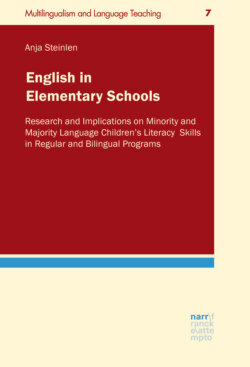Читать книгу English in Elementary Schools - Anja Steinlen - Страница 15
На сайте Литреса книга снята с продажи.
2.2.1 Controversial views on EFL reading and writing in elementary school
ОглавлениеFor many years, there has been a controversy regarding the introduction of FL reading and writing in elementary school. FL literacy skills played only a minor role in the curricula of the Federal States of Germany, and, consequently, literacy activities in the target language were often neglected (or not carried out at all) in elementary school FL classrooms. Critical views which have been put forward on introducing FL reading and writing during the elementary school years include the following arguments (see e.g., Doyé, 2008; Frisch, 2013; Legutke, Müller-Hartmann, Schocker-v. Ditfurth, 2009; Piske, 2010, 2017a, b; Treutlein, Landerl & Schöler, 2013 for more details):
(1) Given the already limited time of exposure, it is irresponsible to familiarize learners with English spelling. The focus in elementary EFL is, therefore, on developing oral and not written communicative competences (i.e., the primacy of oral skills).
(2) Due to the irregular grapheme-phoneme relationships in English, EFL reading and writing tasks put excessive demands on learners (particularly on weak ones), who already have to cope with literacy development in their first language or in the majority language.
(3) Competences in FL reading and writing may be misused as an additional criterion to select learners for transition to different secondary school types (i.e. Haupt-/Mittelschule, Realschule, Gymnasium).
(4) Due to interferences, the introduction of the English writing system may negatively affect the acquisition of written (and oral) German.
Many of the arguments listed above have been invalidated in a number of studies (see Piske, 2010 or Frisch, 2013, for a review). Nowadays, there is a strong tendency to offer a greater number of reading and writing activities the EFL classroom (see e.g., Burwitz-Melzer, 2010; Diehr & Rymarczyk 2010; Frisch, 2013; Legutke et al., 2009; Piske, 2010, 2017a, b; Rymarczyk, 2016):
(1) The learners want to write in English and do so independently and quite naturally, without their teacher asking or supporting them to do so, for the same purposes as they use this skill in their L1.
(2) If prevented from writing, learners may get used to wrong spellings, which may be difficult to change (fossilization). Therefore, it is better not to withhold the correct spelling of words.
(3) Not only are learners interested in writing, but they are also able to identify, understand and become aware of the different principles on which different writing systems are based, provided the explanations are age appropriate.
(4) Integrating reading and writing supports learning, i.e., it appears to be easier for some L2 learners to identify word boundaries or to remember words or phrases if they have seen them in their orthographic form.
(5) Writing activities increase the diversity of teaching methods in the EFL classroom.
(6) Children will start to develop an awareness for individual sound segments such as vowels and consonants only when they learn to read and write alphabetic symbols.
The controversy about whether to introduce English reading and writing in elementary school seems to have subsided in recent years. Nowadays the focus is rather on the question of how to introduce the English writing system. However, there is a dire need for studies relating different approaches to outcomes in L2 reading and writing. For the German context, Frisch (2013) examined effects of different methodological approaches (i.e., the Phonics and the Whole Word Method) on L2 reading, which is discussed in greater detail in chapter 7.1.
